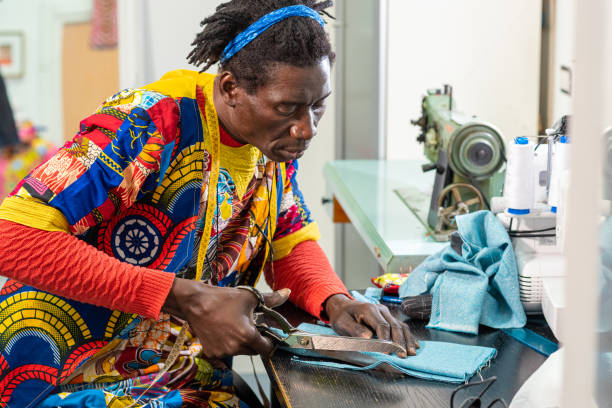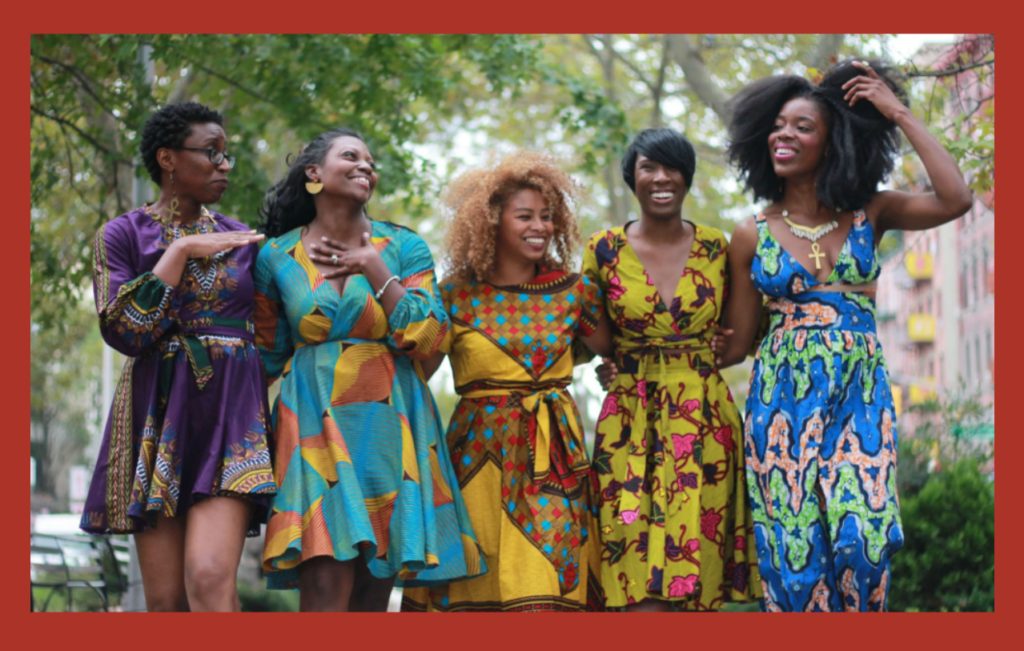African fashion designers are entering global markets through e-commerce platforms

“I’ve always loved and wanted to wear African prints more here,” says Bami Adenike, who lives near alluring luxury boutiques in Paris but has a lasting fondness for African wear. Adenike, a 28-year-old Nigerian artist, moved to France in 2016 and has mostly purchased clothes from French fashion retail stores since then due to the prohibitively expensive costs of having custom-made African dresses shipped to Europe.
When Adenike needed to update her wardrobe in late 2020, she discovered a number of online platforms offering to deliver African apparel to Europe at reasonable prices, and she took a chance ordering through Fashtracker, a marketplace that connects more than 40 African designers with local and international consumers. DHL delivered her prints to her door in Paris within two weeks.
“I must admit that I was taken aback by how well the dresses fit. “I used to spend hours on Pinterest looking at Ankara images with no idea how to get them,” she told TechCabal over the phone. “It’s now become a habit for me to buy brands from Nigeria and, on occasion, other West African countries.”
African fashion has recently sparked significant media interest in the Global North, fueled in part by megastars such as Naomi Campbell, Alicia Keys, and Beyoncé, who wear clothing designed on the continent on occasion. Last year, the latter, a 28-time Grammy winner, was photographed wearing a patterned dress and wide-leg pants by Tongoro, a Senegalese label owned by designer Sarah Diouf.
While celebrities in the entertainment industry have helped propel African designers to international fame, Africans in the diaspora like Adenike are the biggest consumers of clothes exported from the continent, with e-commerce platforms like Nigeria-based Fashtracker and Ivorian site Afrikrea acting as middlemen.
The African Union Commission defines the African Diaspora as “peoples of African origin living outside the continent, regardless of citizenship or nationality, who wish to contribute to the development of the continent and the establishment of the African Union.” This group is found on several continents around the world. An estimated 36 million Africans live outside the country of their birth, with slightly more than half residing on the continent. Because of the size of the African Diaspora, there is a sizable potential market for African fashion collections outside of the continent.
Fashtracker founder and CEO Wunmi Akinsola revealed in an interview with TechCabal for this article that the platform was originally designed to serve African markets. However, this changed when the team discovered that more traction was coming from outside the continent than from within. “I was only running ads in Nigeria and neighboring countries, but half of my customers were from other parts of the world.” As a result, it became clear that there is a massive market out there,” Akinsola explained.
Moulaye Tabouré, Afrikrea’s founder, grew up in Mali but has lived and worked in a number of countries. While in Paris, he discovered that the Africans he met there were mostly interested in African fashion items but couldn’t easily get their hands on them. That sparked the creation of his online marketplace in 2016, with the goal of exporting African culture globally.
“A few months after we launched and had some designers, our close friends noticed we were wearing more African products and became more interested,” Tabouré told TechCabal in an interview. “Afrikrea inspired us to buy more from African businesses, not out of solidarity or charity, but simply out of curiosity.”
According to the company’s data, Afrikrea’s merchant community has completed nearly €8 million in transactions this year, with more than 80% of its orders coming from outside the continent—40% from Europe and 30% from the United States. It claims to receive over 500,000 site visits per month.
Despite stiff competition from other similar platforms, Tabouré believes product diversity has aided Afrikrea’s rapid growth, given that the African Diaspora is not a monolithic group. “The black diaspora is the world’s largest and, by far, the most diverse.” “Having a diverse range of sellers, products, and experiences to cater to everyone has always been critical to our success,” he explained.
Afrikrea and its counterparts are increasingly attracting African designers and micro-businesses along the fashion and art value chains who want to increase their visibility among customers outside the continent. Afrikrea grew its seller base from 500 to 10,000 across 47 African countries in five years and now allows them to showcase and sell African-inspired clothing and accessories to 170 countries worldwide.
Essentially, these platforms serve as a portal to reach global consumers looking for African fashion collections, and they handle all of the resource-intensive components, such as marketing, cross-border shipping, and payments, that would otherwise prevent local fashion designers and dealers from selling beyond their national borders.
“After launching on Instagram and boosting our post, we began receiving a lot of inquiries about purchasing items from people all over the world.” But there was no effective way to get things to them,” says John Pelumi Oyedokun, founder and creative director of Mode Vert Limited, the Nigerian company behind the 2019 fashion label Jon Pelumi. After Akinsola contacted Oyedokun, he formed a partnership with Fashtracker. “Since joining Fashtracker, we’ve been able to sell our products to a growing customer base in Ghana, the United States, and Canada.”
Selling online and shipping abroad has never been a problem for Olakunmi Oni, a Lagos-based fashion designer and the founder of minimalist women’s clothing line, 1964 Brand, but she admits that listing her brand products on Fashtracker “shows our designs to a much wider audience.”
Designers selling on e-commerce sites can typically create storefronts and accept payments from anywhere in the world. Following a purchase, the platform deducts a commission of 10-15% per sale. In terms of logistics, Afrikrea, for example, has a partnership with DHL that allows micro-retailers selling through its platform to ship to their customers for as little as $20 per package. ANKA, a SaaS e-commerce solution for African fashion designers and merchants, was also recently launched, providing a single dashboard to manage multiple sales channels, inventory, and payments.

Platforms for African fashion, whether curators like Afrikrea or single-brand sites like Ghana’s KIKI Clothing, capitalize on a growing global demand for African designer goods via e-commerce. Statista estimates Africa’s e-commerce opportunity to be $19.8 billion, and McKinsey & Company forecasts consumer spending on the continent to reach $2.1 trillion by 2025.
This presents an opportunity for local retailers to promote African fashion globally, especially as consumers shift to online shopping in the face of the raging Covid-19 pandemic. Partnerships with e-commerce platforms transform designers’ otherwise small tailor businesses into global fashion brands, while also opening up the $31 billion Sub-Saharan Africa clothing market to the rest of the world.
Platforms for African fashion, whether curated by Afrikrea or single-brand sites like Ghana’s KIKI Clothing, capitalize on a growing global demand for African designer goods via e-commerce. Statista estimates Africa’s e-commerce opportunity at $19.8 billion, and McKinsey & Company forecasts consumer spending on the continent to reach $2.1 trillion by 2025.
This presents an opportunity for local retailers to promote African fashion globally, especially as consumers increasingly turn to online shopping in the face of the raging Covid-19 pandemic. Partnerships with e-commerce platforms transform designers’ otherwise small tailor businesses into global fashion brands, while opening up the $31 billion Sub-Saharan Africa clothing market to the rest of the world.
However, scaling globally is not without its own set of challenges. Customs officers, mostly from within the continent, continue to be a major impediment to cross-border trade, particularly in the absence of an effective free trade agreement. “Initiatives like the AfCFTA exist but have yet to materialize,” Tabouré said. He goes on to say that African governments can do more by easing customs procedures for people shipping outside of the continent, particularly to Europe. “We want to bring African culture to you, no matter where you are.” Our job is primarily to remain optimistic while remaining pragmatic.”







